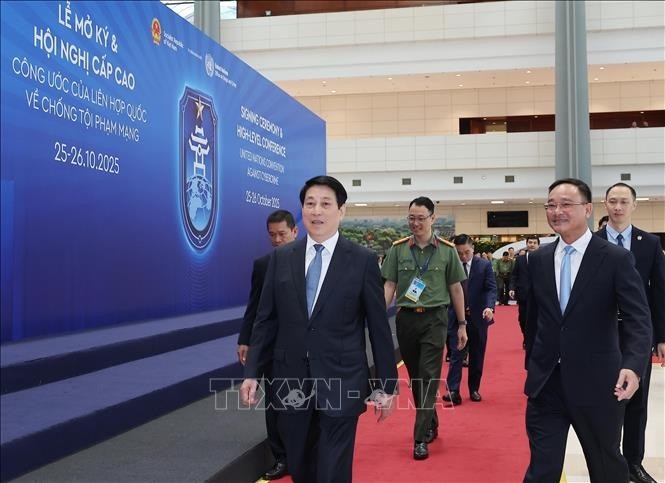The document, also known as Hanoi Convention to be signed by representatives from dozens of countries, is hailed as the first global framework to comprehensively combat cybercrime amid rising digital threats and increasing pressure on cybersecurity systems. It addresses a broad range of offenses, from online fraud and ransomware to human trafficking and hate speech, aiming to curb cyber activities that cost the global economy trillions of dollars each year.
    |
 |
|
State President Luong Cuong (left) inspects preparations for the signing ceremony of the United Nations Convention against Cybercrime at the National Convention Center in Hanoi. |
The convention will take effect once it is ratified by at least 40 U.N. member states and can then serve as a foundation for global cyber governance.
On its website unodc.org, the U.N. Office on Drugs and Crime (UNODC), which led negotiations on the Hanoi Convention, stated that the convention includes provisions protecting human rights and allows countries to refuse cooperation requests that counter international law, while encouraging the facilitation of legitimate research activities.
One key improvement the convention aims to achieve is in the collection and sharing of electronic evidence. It seeks to ensure that all ratifying countries adopt a unified definition and standard for handling electronic evidence. This will enable evidence shared between nations for cybercrime prosecution to be legally recognized in the recipient country’s courts.
In addition, it will help enhance international cooperation. By signing and ratifying the convention, countries acknowledge that cybercrime poses a real threat to global security and amplifies the scale, speed, and reach of terrorism and transnational organized crime. Unified international rules and standards, along with shared expertise, resources, and strong political will under the convention’s framework, will help streamline the prevention and prosecution of cybercrime, enhance global response capacity, and build a safer digital future.
The signing ceremony of the Hanoi Convention will be attended by U.N. Secretary-General António Guterres, with many countries already confirming their participation and intent to sign.
According to the World Bank Blog, if effectively implemented, the document can help fulfill the promise of the digital age, enabling people to benefit from online opportunities without fear of fraud, abuse, or cyber threats. Without shared definitions and tools such as mutual legal assistance, efforts against cybercrime will remain fragmented and ineffective, undermining online safety.
The Budapest Convention on Cybercrime, adopted in 2001, is the first binding international framework on the matter, with over 80 member countries, about half of which are outside Europe. The signing of the Hanoi Convention marks another major milestone in global cyber governance.
Source: VNA